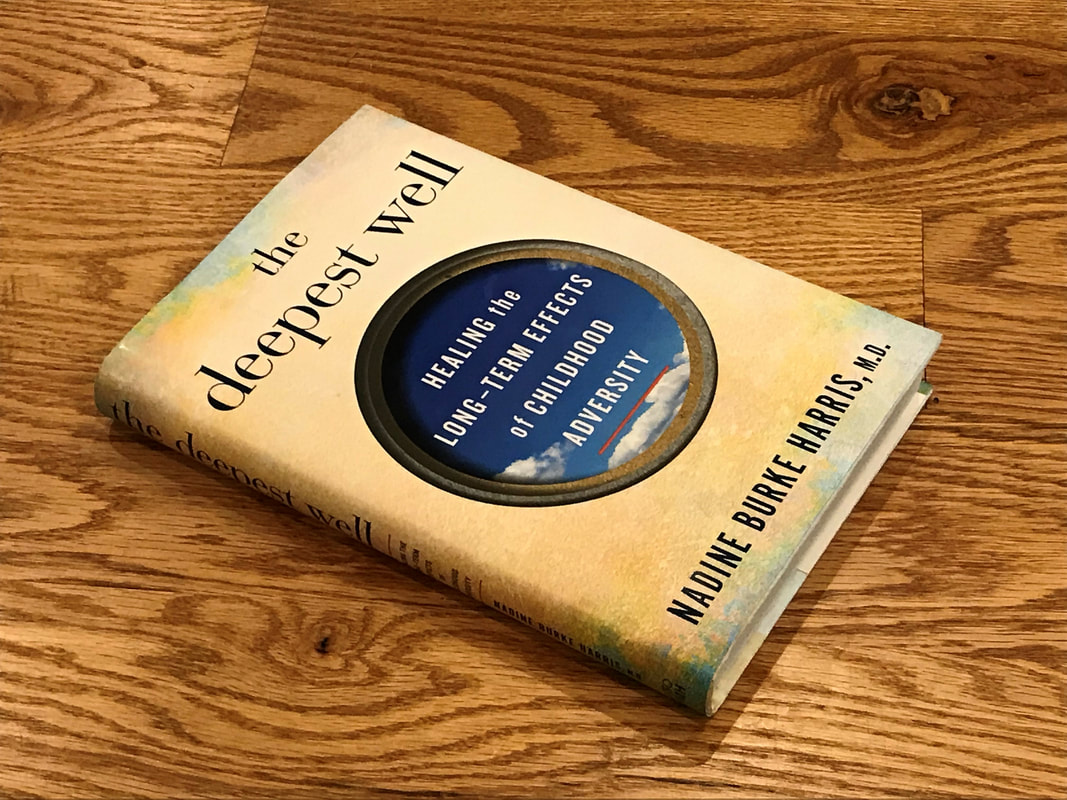|
For an introduction to the science of childhood adversity there really is not a better book out there than The Deepest Well by Nadine Burke Harris, MD. The title comes from the public health story of John Snow tracing the source of a massive cholera outbreak to a community well in London of 1854. This was a breakthrough, as previously cholera was assumed to be spread by foul air. This physician, through applying a systematic approach was able to narrow the source of a public health crisis down to a water source. In the same way childhood adversity has been the secret source of most of our public health problems. From obesity to illicit drug use, from heart attacks and strokes to suicide, childhood adversity plays a larger role than we have ever realized. And when we try to shout it from the mountain-tops we can expect some push-back and skepticism, as when any new concept is brought forward.
Dr. Burke Harris uses a skillful and engaging combination of explaining the science through the stories of discovery, case stories of actual patients she has treated, and anecdotes about family and friends to illustrate the different concepts that need to be understood. Concepts like nature vs. nurture, epigenetics, universal screening, the buffering that caregivers provide, and the physical reactions of the body to toxic stress and childhood adversity. This book is an easy and accessible read for anyone, while also being a foundational text for primary care physicians to understand the importance of considering childhood adversity and the positive results we can expect if we apply universal screening for ACEs (Adverse Childhood Experiences) in our practices. The Healthcare page of TraumaInformedMD.com has a section of links to available screening tools that have been standardized for use in primary care, including Dr. Burke Harris’s. There is also a link to the National Pediatric Practice Community on ACEs which was organized by the non-profit she founded. My favorite part of the book is a small section towards the end where she talks about how children who have grown up as survivors of childhood adversity often develop mini-superpowers. She describes her own ability to stay calm and follow protocols in a life-threatening situation. Some survivors develop an increased ability to be attuned to others, to read nonverbal cues and faces. Some become able to charm others in order to get their needs met, and some develop empathy and compassion for the vulnerable. People in serving professions often come from a background of adversity; they have overcome to use their special abilities to help others. This is my favorite concept. I appreciate the author’s ability to take difficult concepts and make them interesting and easy to understand. I also appreciate her transparency as this is a memoir of sorts. She shares some very painful times in her life with the hope of helping others understand that adversity is something we all face at one time or another. It is not an issue of social class. Only universal screening and awareness would allow us to protect and treat all children. And aren’t they all worthy of protection and healing? Laura Shamblin, MD www.TraumaInformedMD.com
5 Comments
This week I was able to attend the Faith Communities Protecting Children conference in Oklahoma City put on by the Potts Family Foundation, the Interfaith Alliance, and the Center for Child Abuse and Neglect at OU. The keynote speaker was Dr. Darrell L. Armstrong the Pastor of Shiloh Baptist Church in Princeton, NJ and founder of the Institute for Clergy Training. He is the product of the Resilience that is offered by faith in Jesus Christ and the support of his local church in South L.A. while he was in foster care as the child of a teen mom. He went on to attend Stanford University and Princeton Theological Seminary and to be a strong advocate for the role Faith communities can have in protecting and supporting vulnerable children and families. I wanted to let you know I have added 5 new links of National Resources to the Churches page of the site. These look like great new resources to share with your local pastors and clergy. Please check them out and share!
|
Laura Shamblin, MDEditor-in-chief of TraumaInformedMD.com Archives
April 2022
Categories |



 RSS Feed
RSS Feed